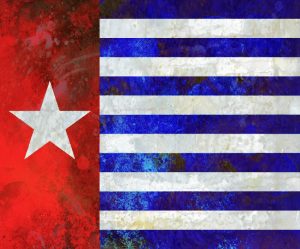Yesterday, I wrote a short article about the continuing unrest in Indonesia’s eastern Papua region, after three United Nations experts issued a statement condemning the government’s “shocking abuses” in its campaign to quell a long-running separatist insurgency.
As if to underscore the statement’s conclusions about the deteriorating security situation in Papua, the Indonesian authorities reported yesterday that attackers believed to be West Papuan separatist rebels killed eight technicians repairing a telecommunications tower in a remote part of region.
According to a report from the Associated Press, which quoted Papua military spokesperson Col. Aqsha Erlangga, the technicians were killed the day before when a group of fighters stormed a Telkomsel cellphone tower while the workers were fixing its transceiver in a rugged tract of Puncak district. One technician managed to escape the attack and flee from the scene.
Aqsha said that the authorities believe the attackers belong to the West Papua National Liberation Army (TPNPB in its Indonesian-language acronym), the military wing of the Free Papua Organization (or OPM), which has been waging a struggle for independence since the 1960s. “This is an extraordinary crime by the armed separatist criminal group amid the government’s efforts to bring economic development,” Erlangga said in a statement quoted by the AP.
Assuming that the information is accurate – and according to some reports, the TPNPB has claimed responsibility for the killings – the attack is the latest incident in a spiral of reaction and counter-reaction between the OPM and the Indonesian state. In their statement this week, U.N. experts claimed that an estimated 60,000 to 100,000 people had been internally displaced in Papua since December 2018, separatist fighters killed 16 laborers working on the Trans-Papua highway, which runs through densely forested regions of highland Papua.
Following the killings of the highway workers, Indonesia deployed more troops in the region – more than 21,000 by March 2021, according to one estimate – resulting in deaths on both sides, dozens of arrests, and the mass displacement of Papuan villagers caught in the middle of the conflict. The situation has worsened further since April, when a high-ranking Indonesian military intelligence officer was ambushed and killed, prompting a further round of crackdowns.
In this week’s statement, the U.N. experts said that in the seven months following the assassination, they had received credible information about instances of extrajudicial killings, including of young children, enforced disappearances, torture, and the enforced displacement of at least 5,000 Papuans. (The Indonesian government unsurprisingly denied the claims made by the U.N.)
As yesterday’s violent attack suggests, Papuan rebels are responding in kind with attacks not just on Indonesian security forces but also on those building the infrastructure that is extending into remote parts of highland Papua, binding them more closely to the rest of Indonesia. Of particular contention is the Trans-Papua highway, a gargantuan project that has become a flashpoint for a number of long-running concerns, from environmental destruction and the exploitation of by foreign mining companies to the presence of Indonesian troops and the arrival of migrants from other parts of Indonesia.
Based on past iterations of the cycle of conflict in Papua, this latest attack will only harden further the attitude of the Indonesian government, speeding the cycle further downward. As Victoria Koman, an exiled human rights lawyer who works on Papua, wrote on Twitter in the aftermath of the attack, “Retaliatory raids by Indonesian forces leading to more displacement are expected.”

































